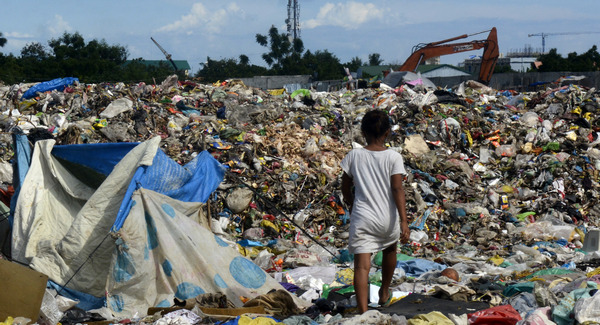
At least fifty children spend their nights in a landfill scavenging for leftovers to eat and junk materials to sell in order to help their families earn a living. Cebu Daily News caught up with some of them one afternoon. In this photo, the kids manage to smile for the cameras unmindful of the heat, the filth, and their extremely difficult
living conditions.
For some children, scars are a testament of the games they had played and the fun they had while playing.
But for others, their scars tell a painful story of how they’ve managed to put food on the table so that their families could live; even while they, themselves, evade death’s invitation.
Jerry (not his real name), 9, has not held a pencil and paper since he left school four years ago after a year of kindergarten.
Since then, his world revolved around a landfill beside their sitio where he picked up plastic bottles, tin cans, and other materials that were profitable to sell to a nearby junk shop.
Because scavenging inside the landfill has been prohibited by the managing local government unit, Jerry, his two elder brothers aged 11 and 13, and at least 50 other children his age ,do their work at night.
Their daily routine starts at 6 p.m., when Jerry, his brothers and his friends, set off to climb a ladder that would bring them to the other side of the wall that separates their homes from the landfill.
To illuminate their path through the mountains of garbage, a few of them use small flashlights.

But Jerry and most of the other children, who did not own a flashlight, could only guess which way to go while picking up trash.
“Kutob mi alas dose, usahay kay hangtod kadlawn. Adto ra man mi matog didto inig human (We stay inside the landfill till midnight, sometimes until dawn. We sleep inside the landfill after looking for garbage.),” said Jerry.
After several years of scavenging nightly, Jerry and his friends have grown accustomed to going home every morning with cuts and piercings from shattered glass and other sharp objects that are scattered throughout the dump site.
Jerry’s small feet and bare hands are now covered with calluses and scars from the wounds of his tough livelihood.
Although he dreams of going back to school to become a policeman someday, Jerry said that he could not simply stop working unless he wanted himself and his other family members to starve.
Jerry explained that his meager earnings from scavenging are turned over to his mother daily so that she could buy rice for the family.
For their viand, Jerry and the other children are more than happy to eat ‘baboy-baboy’ or left-over meat that they find in the trash bags.
Both of Jerry’s parents also earn a living from scavenging.
“Kung di mi kapamasura kay mo-bale mi sa tigtimbang para palit bugas (If we can’t scavenge, we take out a loan from the junkshop),” said Jerry.
Child labor
Jerry and his friends are part of about 152 million children worldwide, trapped in child labor, who are forced to quit school and start working at a very young age.
The International Labor Organization (ILO) defines child labor as any form of work that deprives children of their childhood, their potential and their dignity, and that which is harmful to their physical and mental development.
In a survey conducted by ILO in the Philippines, it was found that at least 2.1 million Filipino children were like Jerry who, at a young age, had been exposed to dangerous work conditions to earn a living.
According to veteran psychologist, Dr. Maryjune
Delgado, Jerry’s experience of working at a very young age may cause his life progress to be stagnant.
“The bitterness of life might become the child’s perspective all throughout his lifetime. It takes away the avenue for him to move forward and have a better life because he does not have proper education that is needed for him to progress,” said Delgado.
Delgado added that children, especially at their formative years, should be given the needed nourishment and care to become the best that they can be.
For his part, Msgr. Joseph Tan, media liaison officer of the Archdiocese of Cebu, said that the Church condemns any form of child labor.
“The Church recognizes the rights of children. They are in a particular time in their life when they should not be compelled to do work that is expected of adults,” he said in an interview.
“Children are at a time for play and personal development. Hence, they should not take the responsibility of work and other burdens simply because of financial constraints,” he said.
Although the Church understands the predicaments of poor families, Tan said, poverty is never a reason to disrespect children. /With a report from Ador Vincent Mayol
Disclaimer: The comments uploaded on this site do not necessarily represent or reflect the views of management and owner of Cebudailynews. We reserve the right to exclude comments that we deem to be inconsistent with our editorial standards.




